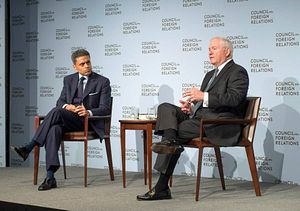Former U.S. Defense Secretary Robert Gates said on Wednesday that China is far from the only country that uses its intelligence services to steal trade secrets and technologies from U.S. businesses.
“What we have accused the Chinese of doing, stealing American companies’ secrets and technology is not new, nor is it done only by the Chinese. There are probably a dozen or 15 countries that steal our technology” in this manner, Gates said during a moderated conversation with Fareed Zakaria on Wednesday hosted by the Council of Foreign Relations in New York City. In fact, according to Gates—who has also served as the director of the CIA—the U.S. is nearly “alone in the world in not using our intelligence services for competitive advantage of our businesses.”
Gates made the comments in response to a question from Zakaria about the decision by the U.S. government to indict five People’s Liberation Army intelligence officers for using cyber-espionage to steal trade secrets from U.S. firms to pass along to their Chinese competitors in order to give the latter a comparative advantage over the U.S. businesses.
The Obama administration has repeatedly maintained that while it is entirely legitimate for countries to use espionage for diplomatic and security purposes, the use of national intelligence services to give domestic firms an unfair advantage over their global competitors is not a legitimate use of espionage. It has almost always only spoken about this type of espionage with regards to China.
In announcing the indictments of the PLA officers this week, U.S. Attorney General Eric Holder stated: “This is a case alleging economic espionage by members of the Chinese military and represents the first ever charges against a state actor for this type of hacking…. The range of trade secrets and other sensitive business information stolen in this case is significant and demands an aggressive response. Success in the global market place should be based solely on a company’s ability to innovate and compete, not on a sponsor government’s ability to spy and steal business secrets.”
Similarly, FBI Director James Comey said, “For too long, the Chinese government has blatantly sought to use cyber espionage to obtain economic advantage for its state-owned industries,” while David Hickton, U.S. Attorney for the Western District of Pennsylvania, argued: “This 21st century burglary has to stop.”
According to Gates, however, China is not alone in using its intelligence capabilities for comparative economic advantage, nor is this kind of espionage particularly new. Gates specifically singled out France as particularly aggressive in its use of economic espionage.
“In terms of the next capable next to the Chinese are probably the French. And they’ve been doing it a long time,” Gates said. “France has been a mercantilist country. The government and business have operated hand-in-hand since the time of Louis XIV. This is not exactly a new development in France.”
Gates went on to explain that for years now the “French Intelligence Services have been breaking into the hotel rooms of American businessmen and surreptitiously downloading their laptops, if they felt those laptops had technological information, or competitive information that would be useful to French” companies.
He did emphasize, however, that “The Chinese probably have the most pervasive system of collecting [economic intelligence] against us of any country. But I think it’s important to remember that they’re not alone.”
Gates admitted that it is hard for people to believe him when he says that the U.S. doesn’t use its highly sophisticated espionage capabilities to give U.S. firms a comparative advantage. He did admit that during his long career in the CIA, he often approached the Commerce Department in trying to create a way for the CIA to give certain kinds of data it collected to private U.S. firms, but said that the Commerce Department was never interested in his proposals.
He said the data that he wanted to give to U.S. firms mostly consisted of “either low-classification or unclassified [data] on the infrastructure of other countries, the electrical grids, the water supply systems, the roads, the weight barrier — what the weight of the bridges could handle,” which any company wanting to build a factory in a country would be interested in knowing. He did not say that he wanted to steal the trade secrets of foreign firms to pass along to their U.S. competitors.
Thus, in maintaining that most countries use their intelligence services to aid their private businesses, Gates isn’t necessarily saying that the intelligence services are stealing trade secrets and intellectual property from foreign firms. Still, in some cases like France, this is exactly what they are doing, calling into question the Obama administration’s decision to indict Chinese intelligence officers for this apparently fairly widespread practice.
Gates discussion with Zakaria touched on many other topics. You can watch it in its entirety below.































